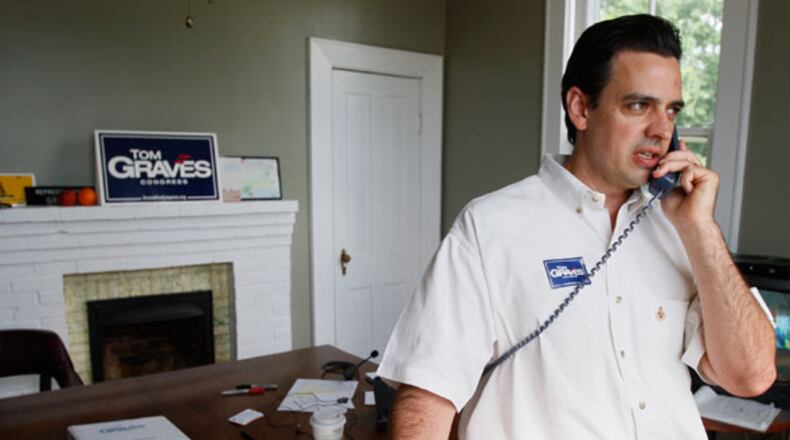In a tweet sent Tuesday, U.S. Rep. Tom Graves of Georgia celebrated the release of a report by the Congressional Budget Office on the GOP's plan to replace Obamacare, embracing it as "great news for Georgia families!"
As soon as I saw that, I thought immediately about the people whom Graves represents. His 14th Congressional District is nestled into Georgia's northwest corner, along the borders of Alabama and Tennessee, and if you've read the CBO report, the repeal of Obamacare will be anything but good news to the people who live there:
1.) Grave's district is relatively poor, dominated by small towns and rural areas, with a median household income in 2015 of $46,378, compared to $
3.) For older people in Graves' district, the transition from Obamacare to Trumpcare will be particularly harsh. Under Trumpcare, insurance companies will be allowed to charge older people significantly higher rates than they can now. In addition, government subsidies to help pay those higher rates will plummet. In fact, in each of the 12 counties represented by Graves, a 60-year-old person making $30,000 a year would see his or her subsidy cut by more than half, in effect forcing them to drop their coverage.
4.) As Graves notes, the CBO does project that by 2026, health insurance rates under the GOP plan would be 10 percent lower than under Obamacare. The question is why, and the answer is not "increased competition." According to the CBO, policies offered under the GOP version will be more bare-bones, with higher deductibles and fewer claims and drugs covered, and thus with lower premiums. And as older people who are more expensive to insure are forced out of the market, the price for everyone else drops a bit. Unless we're willing to let them die an early death, however, those older people are still going to need health care from somewhere, paid for by somebody.
5.) The GOP plan is built on an ideological faith that it will increase competition and thus drive down costs. Unfortunately, the health-care industry just doesn't operate like that, particularly in rural areas like the 14th. With fewer insured and paying customers, health-care providers in those areas have a hard time making a go of it. That's why, on average, rural areas have 68 primary care physicians for every 100,000 residents, compared to 84 per 100,000 in urban areas.
So what happens when you significantly reduce Medicaid and subsidies for private coverage, as the GOP promises to do? With even fewer paying customers, areas such as the 14th will become even less attractive to health-care providers, and even more expensive to serve, and thus even less attractive to development. It undermines everything that might give such regions hope for a better future.
Finally, I'd like to draw your attention to one more subtle but politically important detail in Graves' tweet, in which he describes the GOP plan as the "@POTUS health plan."
As Graves knows full well, the plan was written and conceived by his fellow House Republicans, with the White House as little more than an observer. In fact, Trump spokesmen have made it very clear that the president rejects the term Trumpcare, which is rather remarkable for a man who likes to plaster his name on everything.
But Graves also knows that Trump carried his district by 53 points last fall, and he and other congressional Republicans badly want the president's cover in this debate. They're fearful that a man who promised not to cut Medicaid and to cover everybody is going to turn his back on a plan that covers almost nobody.
.
About the Author
The Latest
Featured



